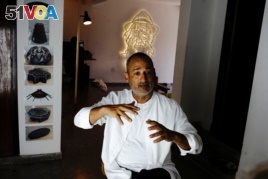04 November, 2018
Artists and rights activists are pushing the Cuban government to change a law that they fear will hurt creativity and increase censorship.
The law is to take effect next month. It bars artists and musicians from "providing their services" in any place open to the public, including privately owned spaces, without first getting government approval.
The Cuban government in 2010 adopted a reform measure to require government approval only for state-run places. Since then, artists and musicians have presented their work in private as part of a wider push for economic, social, and political reforms in Cuba.
Artists and musicians have been able to produce more work and expand their offerings, with increased internet access and greater freedom to travel. But that has also made it harder for the government to collect taxes and oversee their works.
The new law worries some independent artists, who fear they will not be able to get state approval. That could cost them their livelihood.
Luis Puerta is an artist who has supported his family by selling his paintings in private. He told the Reuters news service, "I never thought of emigrating before, but now I am."

Artist Marco Castillo speaks during an interview at his studio in Havana, Cuba, September 12, 2018. Picture taken on September 12, 2018. REUTERS/Alexandre Meneghini
Some believe the new law will prevent artists from speaking out. Luis Manuel Otero Alcantara describes himself as an "artivist." The word is a combination of artist and activist. He said, "This is a measure of repression because you won't get government approval if you are not within the socialist ideology."
Otero Alcantara has led a campaign against the measure. On social media, he and other artists have described it as a "law that converts art into a crime." He and others have also hosted performances to protest the measure. They also have sent letters to Cuban officials.
Marco Castillo, an artist with Los Carpinteros (The Carpenters), said the law "would be a painful return to a gray, anti-cultural past of censorship."
He was talking about the early 1970s, when the Cuban government persecuted artists for what it said was a lack of support for the Revolution. The government later apologized for the treatment.
The Cuban government did not answer a request for comment from Reuters. State-run media reports say that Decree 349, as the law is known, aims to prevent tax avoidance and the spread of art done in bad taste or created to "incite public disorder."
Is the protest working?
There are signs that the artists are making their voices heard.
Amnesty International has backed their campaign against the law. The organization warned that the law could be used broadly to crack down on dissent.
The European Union also raised concerns about the law during recent talks with Cuba on human rights.
The Communist Party newspaper Granma reported this month that the culture minister would work with artists to revise the law.
I'm Jonathan Evans.
Hai Do adapted this story for Learning English based on a Reuters report. Ashley Thompson was the editor.
Write to us in the Comments Section or on 51VOA.COM.
______________________________________________________________
Words in This Story
livelihood - n. a way of earning money in order to live
ideology - n. the set of ideas and beliefs of a group or political party
persecute - v. to treat someone unfairly especially because of race or religious or political beliefs
crack down - v. to control or put limit on someone or something